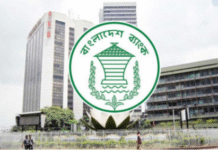Economist, labour leader express doubt
The Bangladesh Garment Manufacturers and Exporters Association has claimed that the readymade garment factories had so far received orders amounting to only 35 per cent of their capacity for the July-December period.
A survey report of the association also claimed that the order prices of the readymade garment products, received so far for the second half of 2020, were 14 per cent lower than the usual prices.
An economist and a labour leader, however, expressed scepticism over the outcome of the BGMEA survey conducted on its 100 member factories.
They said that the recent export performance nullified BGMEA’s claim of decreasing order bookings and falling prices.
‘For July itself, the percentage of booking is 56 of the total production capacity. Considering the consolidated booking status for the second half of 2020, only 35 per cent of the total capacity has been booked,’ said the BGMEA survey.
Although the ‘Analysis of Factory Capacity Booking Survey’ claimed that the apparel industry received 56 per cent work orders against its capacity in July, the export performance of the RMG sector during July 1-22 was close to the amount reported in the same period last year.
An industry insider said that the survey data was not acceptable as another survey conducted on 1,700 factories on June 1 showed that the utilisation capacity of the units was more than 70 per cent.
The survey data will be released soon, he said.
According to the BGMEA data, RMG export in July 1-22 of 2020 reached $1.97 billion despite the global COVID-19 outbreak against export of $2.15 billion reported during the same period in the previous year.
Centre for Policy Dialogue research director Khondaker Golam Moazzem said that there was inconsistency in the data given by the BGMEA survey and the export performance.
He also said that surprisingly, a very poor number of members provided information to the BGMEA for the survey.
Sammilita Garment Shramik Federation president Nazma Akter said that the garment factory owners and its sector leaders were taking benefits from the government on the pretext of the coronavirus pandemic.
She also asked, ‘If the price and placement of orders have decreased, why have the factory owners recently received approval from the labour ministry to ask their workers to do overtime for more than four hours a day?’
The labour and employment ministry in a circular issued on July 16 exempted the export-oriented RMG industry from the obligations of the labour law provisions 100, 102 and 105 related to working hours for six months with retrospective effect from April 17, 2020.
The waiver enables any export-oriented RMG factory owner to ask its workers to do overtime for more than four hours a day.
Nazma alleged that the workers were not getting their wages on time and many were being terminated without any lawful benefits amid the pandemic.
The BGMEA data showed that the surveyed members received confirmed work orders worth 34.46 million pieces in July against their production capacity of 61.32 million pieces.
The survey report said that apparel makers booked 48 per cent, 38 per cent and 30 per cent confirmed work orders against their capacity for the month of August, September and October next respectively.
About 21 per cent and 17 per cent of their capacity have so far been booked for November and December respectively, it showed.









